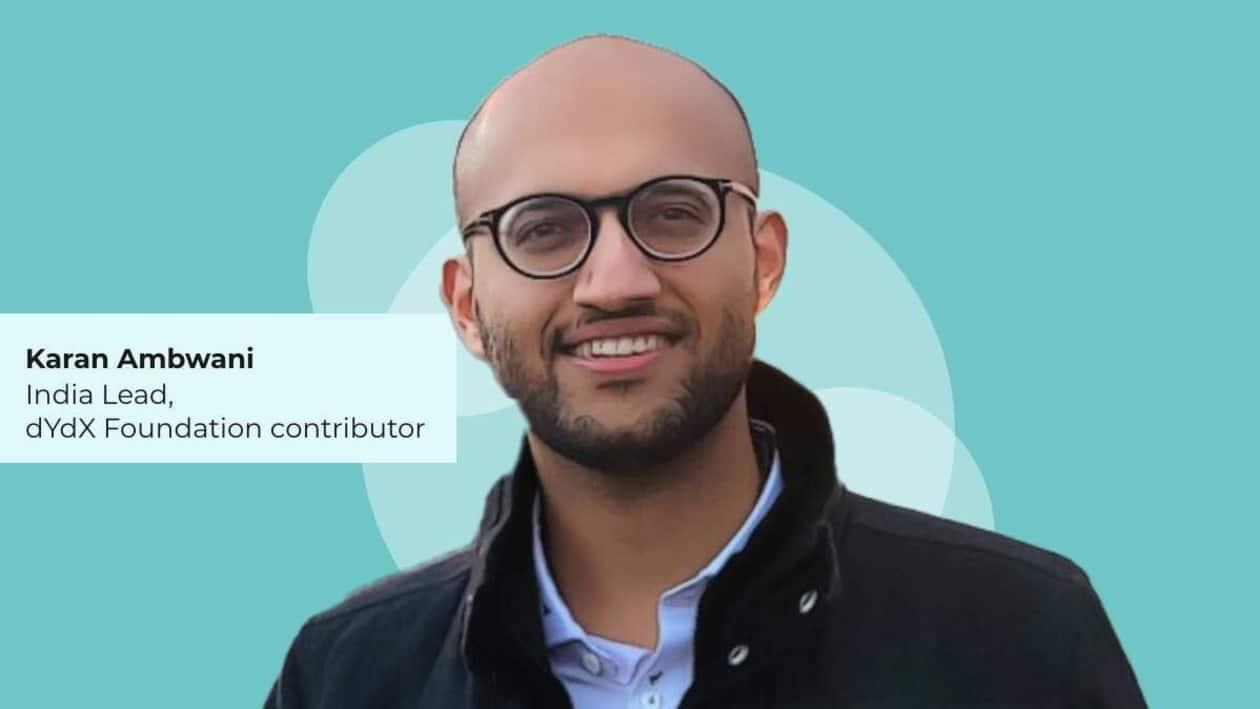Currently at a nascent stage, decentralised finance builds a transparent, accessible and efficient layer for the future of finance and is likely to interact with traditional financial institutions within the next 3-5 years, says Karan Ambwani, India Lead, dYdX Foundation contributor in an interview with MintGenie.
He shares his views about decentralised finance which he refers to as ‘most important technological innovation’ of this century.
He also believes that interoperability is essential for the success of digital currencies, while expressing his views on the need to have an optimum framework of regulations for cryptocurrencies. Mr Ambwani also believes in the promising future which India holds in web3.
Edited excerpts:
What are your views on the untapped potential of decentralised finance? And how long, do you think, it will take before decentralised finance starts to displace the mainstream banking in India?
Decentralised finance or DeFi is one of the most important technological innovations of this century. It builds a transparent, accessible and efficient layer for the future of finance. Though currently at a nascent stage, in my opinion, DeFi would start interacting with traditional financial institutions more closely within the next 3-5 years as we have more battle-tested, secure and resilient systems that are orders of magnitude more efficient than the current financial solutions.
There is a new trend following the recent events in the crypto industry where centralised exchanges are publishing Proof of Reserves of their asset holdings to build back trust for their customers. DeFi is already built in this way from day-one that anyone with even basic knowledge of blockchain tools can check the reserves of any DeFi protocol.
Moreover, you can check each transaction, the movement of assets and the underlying mechanisms of how the DeFi applications have been built and operating. Moreover, the recent events further highlighted the need for self-custody of assets by investors and retail users, which is already a fundamental prerequisite in DeFi.
Can you tell us a bit about Switzerland-based dYdX Foundation, and its India connection?
dYdX Foundation is an independent foundation headquartered in Zug, Switzerland, to participate in propelling the dYdX Protocol into the future.
The focus in India is to build a strong community that supports the development of the protocol and participates more actively in the governance. The Foundation also aims to educate the Indian users on the principles and technical aspects of DeFi, to be future ready and embrace the shift to more secure, transparent and efficient finance.
Amid too much buzz of decentralisation, central banks around the world including the RBI have plans to roll out digital currencies. Do you think these central banks and currency regulators are moving in the right direction when it comes to DeFi?
The success of any new development depends on how they are designed, distributed and finally adopted. There are pilot programs on Central banks digital currencies being conducted across the globe but we are yet to see the mass adoption of CBDCs in any region. Moreover, it remains to be defined how CBDCs will interact with the rest of the Web3 infrastructure and products. This interoperability is necessary to avoid a situation where CBDCs end up only limited to a small cluster of applications just like the early days of intranet that was not composable and did not scale well.
RBI is following a phased approach to test and evaluate the implementation of CBDCs in India. In my personal opinion, the concept note gives a high-level motivation behind the idea and it is still early to comment on how this would evolve and impact the industry at large.
Can you tell us about the future of cryptocurrencies in India? After the finance ministry introduced capital gains tax on the sale of cryptocurrencies in April 2022, followed by 1% TDS on digital currencies — what, do you think, will be the state of crypto trading in India in the near future? Do you think we a fair set of regulations to regulate the crypto-related transactions in India?
Taxation on digital assets is a step forward in the direction to recognise the importance and maturation of the digital assets industry in the country. In my opinion, it would be further encouraging for the industry to have the provision to offset the losses along with the gains, which is a standard practice in many other countries in the EU and North America that have taxes on crypto transactions.
However, the TDS provisions have negatively impacted the trading volumes on exchanges and have made it challenging for high-frequency traders to operate effectively with limited margins. It has further led many companies and talented individuals to move abroad to jurisdictions where the policies are more favourable.
The Web3 community needs to engage in more active dialogue with the policy-makers to come up with an optimum framework that addresses both the aspect of fair taxation along with the sustainability of the human and intellectual capital that would keep India at the forefront of this new digital technology paradigm.
What do you think about the future of crypto exchanges and other blockchain-driven projects in India? Do you think the country is expected to give ample space to both?
India has the largest youth population, affordable internet and digital penetration that are all recipes for growth. There are a number of CeFi and DeFi products like exchanges, investment and portfolio management tools, neo-banking apps that are being built in India for the world. More and more developers are learning Solidity, Rust and other programming languages to contribute to globe remote jobs in the blockchain and Web3 domain.
With more regulatory clarity, comparable tax policies with international standards, capital inflow and active support from ecosystem players, India could be one of the largest contributors to the Web3 economy.
